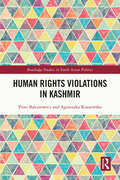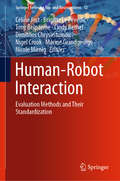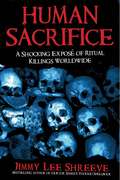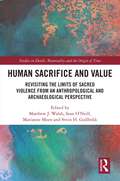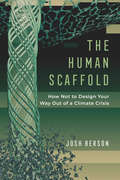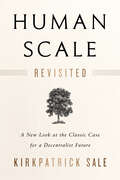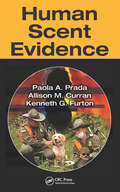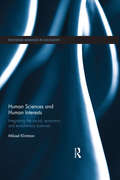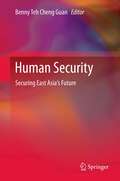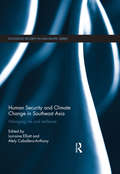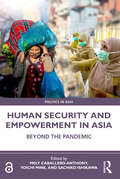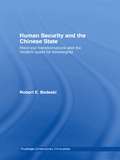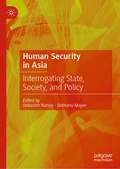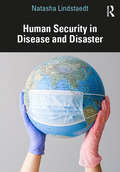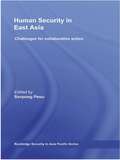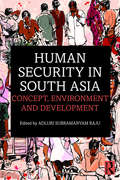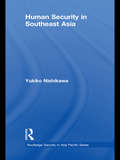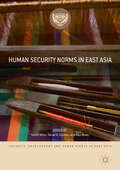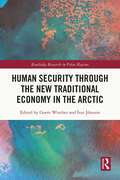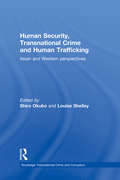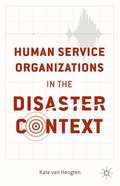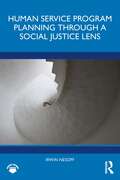- Table View
- List View
Human Rights Violations in Kashmir (Routledge Studies in South Asian Politics)
by Piotr Balcerowicz Agnieszka KuszewskaThe book is a comprehensive study on human rights in Kashmir in relation to the dynamics of Indo-Pakistani policies, providing a structured and interdisciplinary approach to the subject. Whilst surveying some of the most appalling case studies of human rights abuses, the book offers a methodical analysis of the structural and structured human rights violations in the divided Kashmir and placing them in a much broader context of South Asian politics. The book examines root causes responsible for a human rights violations-prone environment and climate of impunity in which the actors perpetrate their crimes unpunished, unwrapping legal and extralegal nexus behind the crimes. Human Rights Violations in Kashmir will appeal to students and scholars of peace and conflict studies, international relations, human rights studies and South Asian studies.
Human-Robot Interaction: Evaluation Methods and Their Standardization (Springer Series on Bio- and Neurosystems #12)
by Céline Jost Brigitte Le Pévédic Tony Belpaeme Cindy Bethel Dimitrios Chrysostomou Nigel Crook Marine Grandgeorge Nicole MirnigThis book offers the first comprehensive yet critical overview of methods used to evaluate interaction between humans and social robots. It reviews commonly used evaluation methods, and shows that they are not always suitable for this purpose. Using representative case studies, the book identifies good and bad practices for evaluating human-robot interactions and proposes new standardized processes as well as recommendations, carefully developed on the basis of intensive discussions between specialists in various HRI-related disciplines, e.g. psychology, ethology, ergonomics, sociology, ethnography, robotics, and computer science. The book is the result of a close, long-standing collaboration between the editors and the invited contributors, including, but not limited to, their inspiring discussions at the workshop on Evaluation Methods Standardization for Human-Robot Interaction (EMSHRI), which have been organized yearly since 2015. By highlighting and weighing good and bad practices in evaluation design for HRI, the book will stimulate the scientific community to search for better solutions, take advantages of interdisciplinary collaborations, and encourage the development of new standards to accommodate the growing presence of robots in the day-to-day and social lives of human beings.
Human Sacrifice: A Shocking Exposé of Ritual Killings Worldwide
by Jimmy Lee ShreeveWelcome to the terrifying world of ritual sacrifice.Around the world, humans are being trafficked, kidnapped, sold, and enslaved for the specific purpose of sacrifice. Mass-scale migration has seen these gruesome techniques exported from the land of the Aztecs and finding their way to the United States, Britain, and many other locations worldwide. Voodoo priests in London have been linked to ritual murders, and not long ago a Palo Mayombe priestess's New York City apartment yielded its grisly secrets. One New Jersey investigator says that sacrificial rites are not only going on today, but can be traced back ninety years in the States alone.Jimmy Lee Shreeve takes us on a nightmare journey, following the initial investigations of Scotland Yard into the murder of a five-year-old boy whose torso was found floating in the Thames in 2001, and traveling to Africa to unveil a grim trade of exporting humans for sacrifice. He uncovers the dark side of voodoo and muti magic, linked with a score of sacrifices and murders, and in Mexico, finds a devotee of Palo Mayombe responsible for torturing his victims and boiling them in a cauldron. Along the way, Shreeve brings his own brand of offbeat detective skills to the fore, providing startling conclusions to some of the world's most horrific murders. Brutal and disturbing, Human Sacrifice takes us into the dark world of twenty-first-century ritual murder.
Human Sacrifice and Value: Revisiting the Limits of Sacred Violence from an Anthropological and Archaeological Perspective (Studies in Death, Materiality and the Origin of Time)
by Matthew J. Walsh Sean O’Neill Marianne Moen Svein H. GullbekkThe present volume was made possible by the Norwegian Research Council’s generous funding of the Human Sacrifice and Value project (FRIPROHUMSAM 275947). It explores concepts of human sacrifice. This volume explores concepts of human sacrifice, focusing on its value – or multiplicity of values – in relative cultural and temporal terms, whether sacrifice is expressed in actual killings, in ideas revolving around ritualized, sanctioned or sanctified violence or loss, or in transformed and (often sublimated) undertakings. Bridging a wide variety of interdisciplinary perspectives, it analyses a spectrum of sacrificial logics and actions, daring us to rethink the scholarship of sacrifice by considering the oft hidden, subliminal and even paradoxical values and motivations that underlie sacrificial acts. The chapters give needed attention to pivotal questions in studies of sacrifice and ritualized violence – such as how we might employ new approaches to the existing evidence or revise long-debated theories about what exactly ‘human sacrifice’ is or might be, or why human sacrifice seems to emerge so often and so easily in human social experience across time and in vastly different cultures and historical contexts. Thus, the volume will strike a chord with scholars of sociology, anthropology, archaeology, history, religious studies, political science and economics –wherever interest is focused on critically rethinking questions of sacred and sanctified human violence, and the values that make it what it is.
The Human Scaffold: How Not to Design Your Way Out of a Climate Crisis (Great Transformations #2)
by Josh BersonHumanity has precipitated a planetary crisis of resource consumption—a crisis of stuff. So ingrained is our stuff-centric view that we can barely imagine a way out beyond substituting a new portmanteau of material things for the one we have today.In The Human Scaffold, anthropologist Josh Berson offers a new theory of adaptation to environmental change. Drawing on niche construction, evolutionary game theory, and the enactive view of cognition, Berson considers cases in the archaeology of adaptation in which technology in the conventional sense was virtually absent. Far from representing anomalies, these cases exemplify an enduring feature of human behavior that has implications for our own fate.The time has come to ask what the environmental crisis demands of us not as consumers but as biological beings. The Human Scaffold offers a starting point.
Human Scale Revisited: A New Look at the Classic Case for a Decentralist Future
by null Kirkpatrick SaleBig government, big business, big everything: Kirkpatrick Sale took giantism to task in his 1980 classic, Human Scale, and today takes a new look at how the crises that imperil modern America are the inevitable result of bigness grown out of control—and what can be done about it.The result is a keenly updated, carefully argued case for bringing human endeavors back to scales we can comprehend and manage—whether in our built environments, our politics, our business endeavors, our energy plans, or our mobility.Sale walks readers back through history to a time when buildings were scaled to the human figure (as was the Parthenon), democracies were scaled to the societies they served, and enterprise was scaled to communities. Against that backdrop, he dissects the bigger-is-better paradigm that has defined modern times and brought civilization to a crisis point. Says Sale, retreating from our calamity will take rebalancing our relationship to the environment; adopting more human-scale technologies; right-sizing our buildings, communities, and cities; and bringing our critical services—from energy, food, and garbage collection to transportation, health, and education—back to human scale as well.Like Small is Beautiful by E. F. Schumacher, Human Scale has long been a classic of modern decentralist thought and communitarian values—a key tool in the kit of those trying to localize, create meaningful governance in bioregions, or rethink our reverence of and dependence on growth, financially and otherwise.Rewritten to interpret the past few decades, Human Scale offers compelling new insights on how to turn away from the giantism that has caused escalating ecological distress and inequality, dysfunctional governments, and unending warfare and shines a light on many possible pathways that could allow us to scale down, survive, and thrive.
Human Scent Evidence (Forensic Science Techniques Ser.)
by Paola A. Prada Allison M. Curran Kenneth G. FurtonDuring the last decade, scientific studies have supported using human scent as a biometric tool and indicator of the presence or absence of an individual at a crime scene. This book focuses on some of these recent advances in the use of human scent as forensic evidence. It examines theories of human odor production, the legal significance of results, and canine scent work from multiple search categories as described in the Scientific Working Group on Dog and Orthogonal detector Guidelines (SWGDOG). It also explores current trends in scent collection techniques, including devices, materials, and storage protocols.
Human Sciences and Human Interests: Integrating the Social, Economic, and Evolutionary Sciences (Routledge Advances in Sociology)
by Mikael KlintmanWithin the disciplines of social, economic, and evolutionary science, a proud ignorance can often be found of the other areas’ approaches. This text provides a novel intellectual basis for breaking this trend. Certainly, Human Sciences and Human Interests aspires to open a broad debate about what scholars in the different human sciences assume, imply or explicitly claim with regard to human interests. Mikael Klintman draws the reader to the core of human sciences - how they conceive human interests, as well as how interests embedded within each discipline relate to its claims and recommendations. Moreover, by comparing theories as well as concrete examples of research on health and environment through the lenses of social, economic and evolutionary sciences, Klintman outlines an integrative framework for how human interests could be better analysed across all human sciences. This fast-paced and modern contribution to the field is a necessary tool for developing any human scientist’s ability to address multidimensional problems within a rapidly changing society. Avoiding dogmatic reasoning, this interdisciplinary text offers new insights and will be especially relevant to scholars and advanced students within the aforementioned disciplines, as well as those within the fields of social work, social policy, political science and other neighbouring disciplines.
Human Sciences and Human Interests: Integrating the Social, Economic, and Evolutionary Sciences (Routledge Advances in Sociology)
by Mikael KlintmanWithin the disciplines of social, economic, and evolutionary science, a proud ignorance can often be found of the other areas’ approaches. This text provides a novel intellectual basis for breaking this trend. Certainly, Human Sciences and Human Interests aspires to open a broad debate about what scholars in the different human sciences assume, imply or explicitly claim with regard to human interests.Mikael Klintman draws the reader to the core of human sciences - how they conceive human interests, as well as how interests embedded within each discipline relate to its claims and recommendations. Moreover, by comparing theories as well as concrete examples of research on health and environment through the lenses of social, economic and evolutionary sciences, Klintman outlines an integrative framework for how human interests could be better analysed across all human sciences.This fast-paced and modern contribution to the field is a necessary tool for developing any human scientist’s ability to address multidimensional problems within a rapidly changing society. Avoiding dogmatic reasoning, this interdisciplinary text offers new insights and will be especially relevant to scholars and advanced students within the aforementioned disciplines, as well as those within the fields of social work, social policy, political science and other neighbouring disciplines.
Human Security: Securing East Asia's Future
by Benny Teh Cheng GuanHuman security is becoming increasingly pronounced in recent years due to changes in the security landscape of world politics. Yet, inter-state relations have continued to dominate security concerns in East Asia. This has, unfortunately, eluded the broader understanding of issues and challenges facing the peoples of East Asia. Home to nations with rapid economic growth and development, East Asia is at the core of what some individuals have termed as the coming Asian Century. Years of economic liberalization and exposure to globalization have permitted the region to achieve high levels of interconnectedness from within and without in unprecedented ways. This has certainly reduced state control and opened up spaces for cross-border human activities. While economic wealth have increased substantially over the years, it has also brought about bigger income disparities, unsustainable safety nets and a surge in social problems from health issues to migratory concerns that threaten the safety and well-being of individuals. Human Security: Securing East Asia's Future timely examines the fundamental issues causing human insecurities and evaluates the extent of which human security plays a role at the state and regional levels. Covering the different areas of threats to humans and applying case study materials, this volume provides an intellectual mix of perspectives that captures the relationship between people, state and region. This book will be of interest to those studying traditional and non-traditional security/threats, Asian human development and critical policy analysis.
Human Security and Climate Change in Southeast Asia: Managing Risk and Resilience (Routledge Security in Asia Pacific Series)
by Mely Caballero-Anthony Lorraine ElliottThis book makes an important and timely contribution to debates about the relationship between climate change and security in Southeast Asia. It does so through a human security lens, drawing on local and regional expertise to discuss the threats that climate change poses to human security in Southeast Asia and to show how a human security approach draws attention to the importance of adaptation and strategies for social resilience. In doing so, it exposes the consequences of climate change, the impact on community rights and access, the special problem of border areas, before going on to investigate local and regional strategies for addressing the human security challenges of climate change.
Human Security and Empowerment in Asia: Beyond the Pandemic (Politics in Asia)
by Mely Caballero-Anthony, Yoichi Mine, and Sachiko IshikawaIn the context of the COVID-19 pandemic, this edited volume revisits the framework of human security and development. It examines the protection-empowerment nexus as applied to various vulnerable groups and populations affected by the pandemic. While the conventional human security literature has focused on top-down protection, this book offers new perspectives on human security by exploring bottom-up empowerment from both theoretical and practical perspectives. It also encourages readers to rethink the agency of vulnerable people in addressing the challenges posed by the pandemic. Through eight case studies from Southeast Asia and Japan, the contributors to this book demonstrate the importance of empowerment in achieving human security. They focus on the responses of vulnerable groups and communities to multiple threats to their lives, livelihoods, and dignity. The chapters discuss key human security concerns, such as poverty, the environment, food, forced migration, gender, health, aging, peace, and justice – all of which have been compounded and exacerbated by the COVID-19 pandemic. An essential resource for students and scholars of human security in the aftermath of COVID-19 and its wider impacts. The Open Access version of this book, available at http://www.taylorfrancis.com, has been made available under a Creative Commons Attribution-Non Commercial-No Derivatives (CC-BY-NC-ND) 4.0 license.
Human Security and Empowerment in Asia: Beyond the Pandemic (Politics in Asia)
by Mely Caballero-Anthony, Yoichi Mine, and Sachiko IshikawaIn the context of the COVID-19 pandemic, this edited volume revisits the framework of human security and development. It examines the protection-empowerment nexus as applied to various vulnerable groups and populations affected by the pandemic.While the conventional human security literature has focused on top-down protection, this book offers new perspectives on human security by exploring bottom-up empowerment from both theoretical and practical perspectives. It also encourages readers to rethink the agency of vulnerable people in addressing the challenges posed by the pandemic. Through eight case studies from Southeast Asia and Japan, the contributors to this book demonstrate the importance of empowerment in achieving human security. They focus on the responses of vulnerable groups and communities to multiple threats to their lives, livelihoods, and dignity. The chapters discuss key human security concerns, such as poverty, the environment, food, forced migration, gender, health, aging, peace, and justice – all of which have been compounded and exacerbated by the COVID-19 pandemic.An essential resource for students and scholars of human security in the aftermath of COVID-19 and its wider impacts.The Open Access version of this book, available at www.taylorfrancis.com, has been made available under a Creative Commons Attribution-Non Commercial-No Derivatives (CC-BY-NC-ND) 4.0 license. Funded by JICA Ogata Sadako Research Institute for Peace and Development.
Human Security and the Chinese State: Historical Transformations and the Modern Quest for Sovereignty (Routledge Contemporary China Series)
by Robert BedeskiOffering a fresh and unique approach to surveying the historical transformations of the Chinese state, Human Security and the Chinese State focuses on human security in contrast with the twenty-first century obsession with national security. Building upon Hobbes' Leviathan, Robert Bedeski demonstrates how the sovereignty of the state reflects primary human concerns of survival, indeed, that fundamental purpose of the state is the preservation of the life of its citizens. Combining political science theory with historical literary, cinematic and sociological materials and ideas, Bedeski has produced a truly original approach to the last two thousand years of Chinese political history, explaining the longevity of the imperial Confucian state and locating the dilemma of modern China in its incomplete sovereignty.
Human Security in Asia: Interrogating State, Society, and Policy
by Debasish Nandy Debtanu MajeeThis book discusses Human Security from a theoretical perspective. It builds theories in order to understand a phenomenon in a structured and well-ordered way. It sheds light on the conditions of the economy, food, health, community, environmental and political security in Asian states. It explores the idea of human security to understand the issues jeopardizing an individual’s security in the Asian continent and suggests policies to overcome these problems. This book argues that the nature of the government and the constitution are equally essential in ensuring the human security of a country. Some countries in Asia are not only economically vulnerable but also politically disrupted. The issues of hunger, poverty, illiteracy, militancy, terrorism, and ethnoreligious conflicts have posed threats to human security. The pandemic COVID-19 has brought a great humanitarian crisis. The role of the Asian states in combatting COVID-19 and protecting public health is highlighted in this book. With a multidimensional outlook this edited volume attempts to delineate an interdisciplinary discourse of human security in an Asian context.
Human Security in Disease and Disaster
by Natasha LindstaedtThis timely new textbook lays bare the ways in which disease and disaster can turn politicians into global leaders or national liabilities. It explains the impact of crises on development and human security and explores how states and societies can respond more effectively. Written primarily for the student of politics, but also drawing from public health, public policy, and environmental studies, the book investigates the threats posed by disease and disasters, and demonstrates how states can shape the ways in which these crises unfold. Case studies include: • Diseases such as Covid-19 and Ebola • Natural disasters such as Typhoon Haiyan and the 2010 Haiti earthquake • Manmade disasters such as the Yemen and Congo civil wars or famine The book delves deep into how state response to these challenges can impact political and economic stability and ends by exploring the role played by international institutions and international cooperation in addressing common challenges. This introductory textbook is perfect for undergraduate and masters courses exploring the expanding politics and human security issues surrounding disease and disasters. It will also be of interest to think tanks and policy communities looking for fresh insights to bring into professional practice.
Human Security in East Asia: Challenges for Collaborative Action (Routledge Security in Asia Pacific Series)
by Sorpong PeouSince the end of the Cold War the number of interstate wars has remained relatively low, although whilst states may be more secure than ever this does not mean that individual human beings are too. This has led to a growing recognition of the importance of human security, in contrast to the traditional realist focus on state security. This book explores human security in East Asia, focusing in particular on the challenges to collaboration among actors involved in the process of human security promotion. It examines the theoretical complexities of conceptual arguments about human security, drawing on the ideas of scholars from Asia and the West, to provide a global perspective on what causes human insecurity and how security can best be achieved. It considers in detail case studies of military interventions in East Asia, in particular East Timor, and assesses how successful collaborative efforts have been in providing human security. It also explores case studies of non-military intervention, including international criminal justice in Cambodia and East Timor. It discusses the relationship of regional great powers such as China and Japan to human security promotion, arguing that it will be better served if these powers engage less in the traditional game of geopolitics and if human security objectives do not work against actors' interests. It shows how interventions to uphold human security have not always succeeded to the extent that was hoped, despite the best of intentions, and considers how improved collaboration can be achieved, so that future interventions enjoy more consistent success.
Human Security in South Asia: Concept, Environment and Development
by Adluri Subramanyam RajuThis book delves into the theory and praxis of human security in South Asia. Home to almost a quarter of the world’s population and fast emerging markets, South Asia holds social, geopolitical and economic significance in the current global context. The chapters in the volume: examine the challenges to human security through an exploration of environmental issues including water availability, electric waste, environmental governance and climate change; explore key themes such as development, displacement and migration, the role of civil society, sustainable development and poverty; and discuss developmental issues in South Asia and provide a holistic picture of non-military security issues. Bringing together scholars from varied disciplines, this comprehensive volume will be useful for researchers, teachers and students of international relations, human rights, political science, development studies, human geography and demography, defense and strategic studies, migration and diaspora studies, and South Asian studies.
Human Security in Southeast Asia (Routledge Security in Asia Pacific Series)
by Yukiko NishikawaThere is a growing interest in human security in Southeast Asia. This book firstly explores the theoretical and conceptual basis of human security, before focusing on the region itself. It shows how human security has been taken up as a central part of security policy in individual states in Southeast Asia, as well as in the regional security policy within the Association of Southeast Asian Nations (ASEAN). The book discusses domestic challenges for human security including the insurgencies in southern Thailand, the Philippines and Indonesia. Transnational security issues such as terrorism, drugs, human trafficking and the situation in Burma are explored by the author, and the ‘ASEAN’ way of contrasting the values and approaches of Southeast Asian countries with those in the West is assessed. By focusing on the ongoing changes and efforts to achieve human security in Southeast Asia, this book contributes to theoretical debates on human security as well as regional studies on Southeast Asia.
Human Security Norms in East Asia (Security, Development and Human Rights in East Asia)
by Yoichi Mine Oscar A. Gómez Ako MutoThis book reveals how the idea of human security, combined with other human-centric norms, has been embraced, criticized, modified and diffused in East Asia (ASEAN Plus Three). Once we zoom in to the regional space of East Asia, we can see a kaleidoscopic diversity of human security stakeholders and their values. Asian stakeholders are willing to engage in the cultural interpretation and contextualization of human security, underlining the importance of human dignity in addition to freedom from fear and from want. This dignity element, together with national ownership, may be the most important values added in the Asian version of human security.
Human Security through the New Traditional Economy in the Arctic (Routledge Research in Polar Regions)
by Gorm Winther Ívar JónssonThe book creates an augmented knowledge about human security beyond the warfare concept in the Arctic. It analyzes international political analysis on security issues and their spillovers to the Arctic societies.The multi-contributed book helps to conceptualize and create knowledge on democratic businesses as a human security issue. Adopting a comparative approach, it provides detailed analysis of democratic business in Iceland, Greenland, Arctic Canada, and Alaska. In a comparative economic systems analysis, the aim of this book is to introduce the reader to the new traditional economy in an Arctic Context. The readers will get an overview of different security approaches and approaches to promoting the new traditional economy’s emphasis on Aborigine traditions for commonhood, common or non-ownership, cooperation, and local community.The book is multidisciplinary and will be of interest to scholars and students in the fields of social sciences, security studies, human security, international political economy, international political science, ecological science, economics, organization theory, and sociology.
Human Security, Transnational Crime and Human Trafficking: Asian and Western Perspectives (Routledge Transnational Crime and Corruption)
by Louise Shelley Shiro OkuboIn recent years, drug use, illegal migration and human trafficking have all become more common in Asia, North America and Asia: the problems of organized crime and human trafficking are no longer confined to operating at the traditional regional level. This book fills a gap in the current literature by examining transnational crime, human trafficking and its implications for human security from both Western and Asian perspectives. The book: Provides an outline of the overall picture of organized crime and human trafficking in the contemporary world, examining the current trends and recent developments contrasts the experience and perception of these problems in Asia with those in the West, by analyzing the distinctive Japanese perspective on globalization, human security and transnational crime examines the policy responses of key states and international institutions in Germany, Canada, the United States, the European Union, Japan, and Korea. This book argues that any effort to combat these crimes requires a response that addresses the welfare of human beings alongside the standard criminal law response. It represents a timely analysis of the increasingly serious problems of transnational crime, human trafficking and security.
Human Service Organizations in the Disaster Context
by Kate Van HeugtenHuman Service Organizations in the Disaster Context explores the efforts of human service practitioners to support communities facing the impacts of large-scale hazardous events. Using the stories of frontline workers and managers who lived through devastating earthquakes in Canterbury, New Zealand in 2010 and 2011, and drawing on international research and sociological theory, van Heugten astutely analyses the challenges and opportunities that arise. In the immediate aftermath of disasters, there is often a surge in altruism giving rise to hope for improved social cohesion. This hope wanes when negative impacts fall unequally on people living in poverty and other vulnerable populations. Political, financial, and professional interest groups vie for power and local citizens' voices are frequently overruled. Human service workers act as boundary spanners, networking between organizations to draw attention to the concerns of vulnerable people, and to advocate for human rights and social justice.
Human Service Program Planning Through a Social Justice Lens
by Irwin NesoffHuman Service Program Planning Through a Social Justice Lens provides a foundation in social justice to students while developing practical skills and knowledge about the steps and tasks involved in planning social programs.Through the "parallel process" of contextualizing social issues while teaching the process of program planning, students will develop a perspective on the need for social justice planning and its impact on marginalized communities and populations. The textbook explores current concepts and approaches to understanding social issues and involving impacted communities and individuals. These include: Intersectionality, Appreciative Inquiry, Participatory Planning and Visioning, which serve to challenge preconceptions while coupling these with the step-by-step approach to planning using the Logic Model.Utilizing meaningful examples to demonstrate how social justice planning can be implemented, Human Service Program Planning Through a Social Justice Lens is appropriate for students of social work as well as practitioners in human services, public administration and public health.
Human Service Program Planning Through a Social Justice Lens
by Irwin NesoffHuman Service Program Planning Through a Social Justice Lens provides a foundation in social justice to students while developing practical skills and knowledge about the steps and tasks involved in planning social programs.Through the "parallel process" of contextualizing social issues while teaching the process of program planning, students will develop a perspective on the need for social justice planning and its impact on marginalized communities and populations. The textbook explores current concepts and approaches to understanding social issues and involving impacted communities and individuals. These include: Intersectionality, Appreciative Inquiry, Participatory Planning and Visioning, which serve to challenge preconceptions while coupling these with the step-by-step approach to planning using the Logic Model.Utilizing meaningful examples to demonstrate how social justice planning can be implemented, Human Service Program Planning Through a Social Justice Lens is appropriate for students of social work as well as practitioners in human services, public administration and public health.
